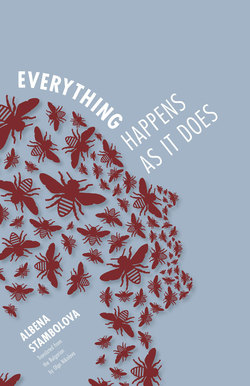Читать книгу Everything Happens as It Does - Albena Stambolova - Страница 11
На сайте Литреса книга снята с продажи.
Оглавление5.
Sisters and Brothers
His reticence did not diminish with the years. Since he learned faster than others, he had the small privilege of taking his exams in writing. They had suggested to his parents that he should pass some tests and go to a school for gifted children. But his parents had rejected the idea. What difference did it make if the child could learn faster—sending Boris to a different school meant acknowledging he was different. And that would have been too much.
But when he ranked first in the entry exams for the English Language School, there was no choice. Boris was to live with his sister in Plovdiv, where his room had already been prepared.
He didn’t feel like leaving the village. Here he had conquered his own territory and he knew he could be left alone. In the city, he would have to start from scratch.
In any case, he had no choice. He had to continue his studies. He was glad he was older, because with age, the opportunities to raise barriers between himself and others grew larger.
His life in Plovdiv began with observing his sister’s family. A husband and two children; he was the children’s uncle. They all behaved as if being a family was the most natural thing in the world. The family seemed to engender and maintain itself. Maybe that was the case.
He quickly managed to discourage his sister from accompanying him anywhere. He drew his own itineraries and came to like the city, where he could be even less visible.
He liked the open-air amphitheater the best. There were people there at all times, like everywhere else in the city, but the space was designed for it. It was created with many people in mind. Even when it was empty, a distant din seemed to ripple through the air, inhabiting the area. He was moved by this ghostly presence. To him the human race appeared remarkable, as long as it remained at a distance.
The idea of apartment space, for example, seemed ridiculous to him. In the kitchen you cook. In the sitting room you sit. The bedroom is for sleep, and the children’s room is for play. And in order to legitimize this division of space, people fitted each room with the respective pieces of furniture and appliances. And as if that was not enough, the damn shapes of these spaces simply drove him to despair.
They were all the same. He could see it from the outside. A mere glimpse at the façade and he could picture the hive inside. A hive that was not a real hive, and was much worse than the little man-made toy houses for the so-called domestic bees. What human beings considered rational was miles away from the living economy of bees. Between the act of pressing the washing machine button and the mood of the person pressing it there was an entire universe of folly that people called their lives.
Houses were a different story—when they were not ruined by the desire to transform them into modern apartments. They revealed unexpected spaces, which welcomed human beings the way a wooded glade did. But that was rare. He had looked carefully at all the houses in the old part of the city, but they all resembled taxidermied animals. Even if they had been alive before, today they were lifeless. Their colors were almost painful to look at.
His sister made it her habit to come into his room to wake him early in the morning. Even when she realized that Boris was always awake by the time she came in, she persisted. He decided not to deprive her of this privilege, allowing her to keep this tiny harmless territory so he could gain much larger terrain. For example, the right to be absent from the evening gatherings of the family. Or the right not to watch television.
His sister began to feel a peculiar awe toward him. Once Boris had openly acknowledged that he was different, she was no longer surprised by anything he did. He functioned like clockwork, always doing the same things at the same time of day, without showing impatience or boredom. He never talked about school or about his friends. How was he?—He was fine. Was everything alright?—It was.
The profound difference between them was compensated for by the absence of any serious problems. His behavior suggested that everything was under control, and people around him, at a loss about what else to think, reassured themselves that indeed “everything was under control,” believing they had reached that conclusion alone. Meanwhile, Boris spent his time reading, the overlap between his inner and outer age thinned, and he seemed to be always deep in thought, always thinking, but about what—that was beyond anyone’s guess.
